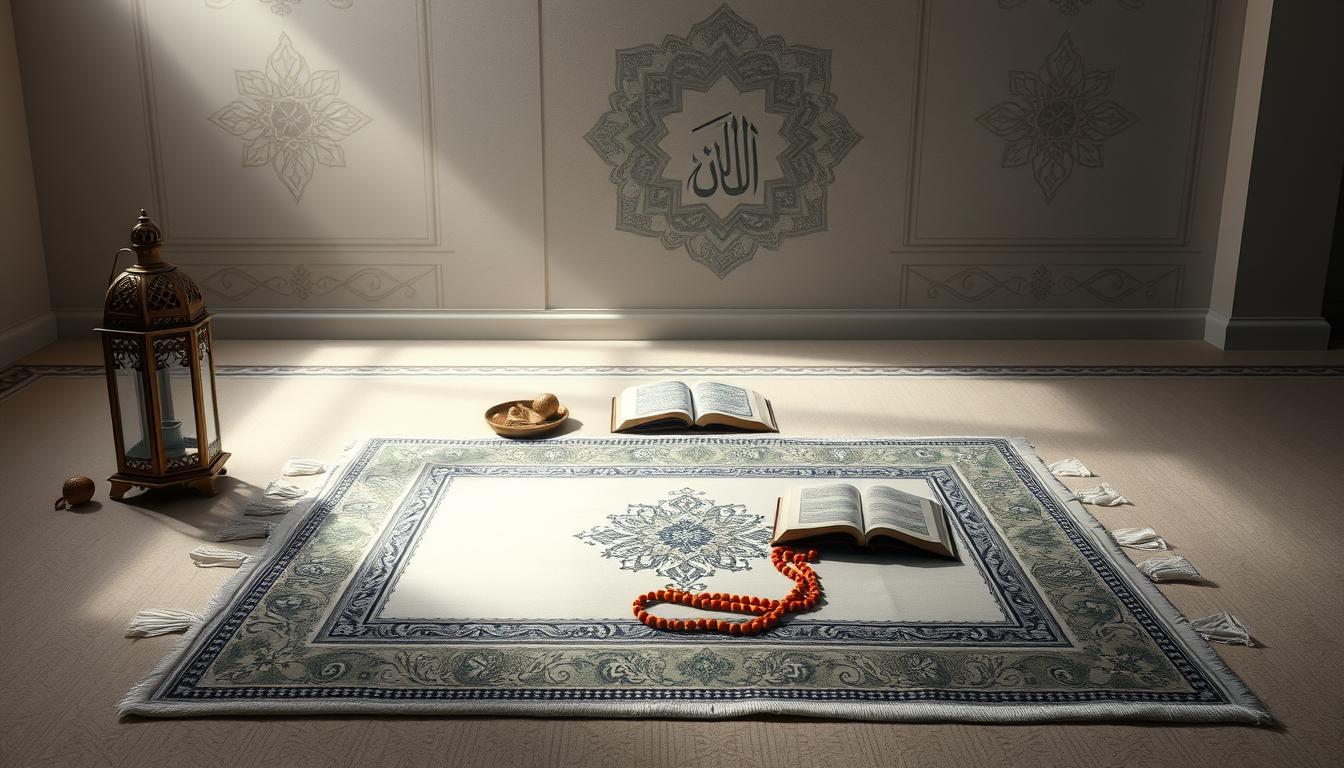We welcome you to our community. We invite you to join us in our mission to change lives through faith-based work. We aim to give you the knowledge and confidence to pray well in Islam. Prayer, or Salah, is key in Islam, and knowing how to pray is crucial.
In this article, we’ll guide you through the basics of prayer. We’ll cover why prayer is important, how to pray, and its benefits. Our goal is to help you connect with your faith and start your spiritual journey strong.
We’ll explore the five daily prayers in Islam. These are Fajr, Dhuhr, Asr, Maghrib, and Isha. We’ll talk about why each prayer is important. Our aim is to make learning about prayer easy and accessible for beginners.
We believe everyone should have the chance to learn and grow in their faith. We’re here to help you with the tools and support you need. Whether you’re new to Islam or want to understand prayer better, join us on this journey of discovery and spiritual growth.
Key Takeaways
- Islamic prayer is a fundamental pillar of Islam and is essential for spiritual growth and development.
- A comprehensive prayer guide can help Muslim beginners establish a strong foundation for their spiritual practice.
- Regular prayer practice can have numerous benefits, including increased faith, improved mental health, and a stronger sense of community.
- There are five daily prayers in Islam, each with its own unique significance and benefits.
- With the right resources and support, anyone can learn to pray in Islam and experience the many benefits it has to offer.
- A prayer guide can provide valuable insights and guidance for Muslim beginners, helping them to navigate the world of Islamic prayer with confidence and clarity.
Understanding the Importance of Islamic Prayer
Islamic prayer is very important for Muslims. It helps them connect with Allah and find peace. It also helps them grow spiritually.
Prayer is a key part of being a Muslim. It’s mentioned in the Quran and Hadith. Each prayer has its own special benefits.
For example, the Fajr prayer is very blessed. It’s a time of mercy.
Regular prayer brings many benefits. These include:
- Increased self-awareness and emotional balance
- Improved mental health and well-being
- Enhanced spiritual growth and connection with Allah
- Greater sense of community and belonging
By making prayer a daily habit, we can feel closer to our faith. We also feel more connected to our community. This helps us support each other on our spiritual paths.
| Prayer | Number of Rakah | Timing |
|---|---|---|
| Fajr | 2 | Dawn |
| Dhuhr | 4 | Noon |
| Asr | 4 | Afternoon |
| Maghrib | 3 | Sunset |
| Isha | 4 | Night |
Essential Prerequisites for Prayer
We believe prayer is a powerful way to connect with our faith and community. Before we pray, it’s important to think about the prayer prerequisites that make our experience better. Cleanliness and intention are key.
To get ready for prayer, we must make sure our body, clothes, and prayer space are clean. This cleanliness is not just physical but also spiritual. It helps us focus and connect with our faith. We can do this by performing wudu, a ritual of purification that includes washing our hands, face, and feet.
Another important prayer prerequisite is intention. Our intention should be pure and focused on the prayer, without distractions. We should be humble and grateful, recognizing the blessings and mercy of our faith.
By meeting these prayer prerequisites, we lay a strong foundation for our spiritual practice. We can feel peace, tranquility, and a sense of community when we pray with a clean heart and pure intention.
- Perform wudu to purify our body and spirit
- Choose a clean and quiet prayer area
- Focus our intention on the prayer practice
- Cultivate humility and gratitude in our prayer
By following these guidelines, we can improve our prayer experience and connect with our faith more deeply. We believe working together can build a stronger, more compassionate community. A community that supports and uplifts each other on our spiritual journey.
| Prayer Prerequisites | Importance |
|---|---|
| Cleanliness | Physical and spiritual purification |
| Intention | Pure and focused intention |
Preparing Your Prayer Space
We believe a sacred and peaceful prayer space is key for a strong bond with Allah. Choose a quiet spot free from distractions. Make sure it has the essentials like a prayer mat and the Quran.
Where you pray is very important. It should be a place where you can pray without being interrupted. Some like a dedicated room, others a quiet corner. It’s important it’s clean and free from distractions.
The items you use for prayer can also improve your experience. A prayer mat makes praying comfortable and clean. Items like prayer beads or the Quran help you stay focused.
Creating a sacred prayer space deepens your connection with Allah. Choose a quiet spot and make sure it has the right items.
| Prayer Items | Description |
|---|---|
| Prayer Mat | A clean and comfortable surface for prayer |
| Copy of the Quran | A sacred text that guides and inspires prayer |
| Prayer Bead | A tool to help focus on prayer and meditation |
Achieving Physical and Spiritual Purification
We think it’s key to purify both body and soul before we pray. That’s why wudu, the Islamic ritual, is so important. It cleanses our body and mind, getting us ready for prayer.
When we get ready to pray, we remember the need for spiritual cleansing. This means making our hearts and minds pure. We do this by focusing on our intentions, staying humble, and being true in our prayers.
Important parts of both physical and spiritual cleansing include:
- Doing wudu for physical cleansing
- Making our hearts and minds pure spiritually
- Keeping our intentions clear and being humble in prayer
By purifying ourselves physically and spiritually, we grow closer to God. This makes our prayer time more meaningful. As we keep ourselves pure, our faith and devotion get stronger.
Learning to Pray: Basic Steps and Movements
We encourage our readers to practice the basic steps and movements of prayer. It’s important to do so with humility and sincerity. The steps, including qiyam, ruku, and sujud, are key parts of the Islamic prayer.
First, we stand in the qiyam position. Then, we bow down in ruku, placing our hands on our knees. Lastly, we go into sujud, the most humble position, where we put our forehead on the ground.
These movements are done with specific prayers and recitations. They help us focus our minds and hearts on the prayer. By following these steps, we can grow in humility and sincerity in our prayers.
Some key points to remember when practicing the basic steps and movements of prayer include:
- Start with the standing position, qiyam
- Move into the bowing position, ruku
- End with the prostration position, sujud
By mastering these basic steps and movements, we can improve our prayer experience. We can also strengthen our connection with our faith.
Understanding Prayer Times and Schedules
We think it’s key to pray at the right prayer times to keep a regular prayer habit. In Islam, there are five daily prayers: fajr, dhuhr, asr, maghrib, and isha. Each prayer has its own time and meaning.
Here’s a quick look at the five daily prayers and their prayer times:
- Fajr: Dawn prayer, done before the sun rises
- Dhuhr: Noon prayer, when the sun is highest
- Asr: Afternoon prayer, in the late afternoon
- Maghrib: Sunset prayer, right after sunset
- Isha: Night prayer, before bed
Knowing and following these prayer times helps us connect more with Allah. It also builds discipline and responsibility in our daily lives.
Mastering Prayer Recitations
We encourage our readers to master the prayer recitations. It’s key to understand the meaning and importance of the Quranic verses. The web sources offer help with the prayer recitations, including the surahs and verses from the Quran.
Some important points for mastering prayer recitations are:
- Understanding the meaning and significance of the Quranic verses
- Connecting with the divine message through prayer recitations
- Reciting the surahs and verses from the Quran with accuracy and devotion
By mastering prayer recitations, we can deepen our understanding of the Quran. This strengthens our connection with the divine. It also makes our prayer experience more meaningful and fulfilling.
Common Mistakes to Avoid While Praying
We often make mistakes while praying. It’s key to know these errors to better our prayer practice. Common prayer mistakes include physical errors and recitation mistakes.
Physical errors can be fixed by practicing the right movements and positions. For instance, keeping our feet parallel and hands in the right spot helps us stay focused. Recitation mistakes can be avoided by practicing the correct pronunciation and intonation.
We should also pay attention to our concentration during prayer. Avoiding distractions and staying focused on our intentions is crucial. By being aware of these common mistakes and correcting them, we can improve our prayer practice and deepen our connection with God.
- Avoid physical errors by practicing correct movements and positions
- Correct recitation mistakes by practicing pronunciation and intonation
- Stay focused and avoid distractions during prayer
By being mindful of these common mistakes and taking steps to correct them, we can enhance our prayer experience. This helps us cultivate a deeper sense of spirituality and connection with God.
Using Technology to Support Your Prayer Journey
We know how important technology is for our spiritual growth, including prayer. Prayer apps and technology help us stay close to our faith. They send us prayer reminders all day long.
About 40% of Americans use apps or websites for religious activities like praying. This shows how digital tools are becoming more popular for spiritual practices.
Using technology for prayer has many benefits:
- It makes it easy to find prayer resources and get reminders.
- It lets us track our progress and set goals for spiritual growth.
- It connects us with others who share our faith, offering support and encouragement.
By using technology and prayer apps, we can learn more about our faith. We can also grow spiritually. Let’s use these tools to stay focused and committed to our prayer journey.
Building Consistency in Your Prayer Practice
Creating a regular prayer routine is key to deepening our bond with Allah. It helps us grow spiritually. Setting aside time each day for prayer is a simple yet powerful step.
Tracking our progress is crucial for consistent prayer. We can use a prayer journal or a mobile app to log our prayers. This helps us see where we can improve and adjust our routine.
Here are some tips to enhance your prayer consistency:
- Start small and gradually increase prayer time
- Find a quiet and comfortable prayer space
- Use a prayer schedule or planner to stay organized
- Make prayer a habit by incorporating it into daily routines
By following these tips and staying committed, we can build a strong prayer practice. Remember, patience, persistence, and sincerity are the keys to success.
Special Circumstances and Prayer Adaptations
We understand that prayer is a personal and intimate experience. Special circumstances can make it hard for some to pray in the usual way. That’s why prayer adaptations are important. They help people stay connected spiritually, even with physical or health challenges, like disability.
For example, those with mobility issues might need to change how they pray or use tools to help. People with sensory problems might need different ways to follow prayers or use touch to stay involved.
By recognizing and meeting these special circumstances, we build a more welcoming community. This community values everyone’s spiritual health, no matter their abilities. It shows our faith’s kindness and understanding.
Here are some prayer adaptations for those with disability or other special circumstances:
- Using a prayer chair or stool for support during prayer
- Adapting prayer postures to accommodate physical limitations
- Utilizing assistive technology, such as prayer apps or audio guides, to facilitate prayer practice
By supporting these prayer adaptations and raising awareness about special circumstances, we make prayer more accessible. This way, everyone can deepen their spiritual connection.
Enhancing Your Prayer Experience
We believe prayer is a powerful tool for spiritual growth and connecting with God. To make your prayer better, try using mindfulness. This means focusing on your breath and calming your mind.
It’s also key to develop khushu, or concentration. Find a quiet spot for prayer, away from distractions. This helps you feel more peaceful and connect with God deeply.
Here are some tips to improve your prayer:
- Start with a clear intention and focus on your prayer
- Use mindfulness techniques to calm your mind and center yourself
- Develop khushu by setting aside a specific time and place for prayer
- Be sincere and genuine in your prayer, and don’t be afraid to express your true feelings and emotions
By following these tips, you can feel closer to God. Remember, prayer is personal. What works for one might not work for another. Stay patient and committed, and trust God will guide you.

Community Support and Group Prayer
We think community support and group prayer are key for growing spiritually. When we pray together, we feel a strong bond with others. This bond is crucial for our emotional and spiritual health. In mosques, people often pray together, supporting each other.
Some benefits of group prayer include:
- Increased sense of community and belonging
- Improved mental and emotional health
- Enhanced spiritual growth and development
Group prayer helps us feel closer to God and each other. We can lift each other up and make a positive space. By focusing on community and prayer, we build strong, resilient communities ready for challenges.
Let’s aim to build a community that supports and prays together. This way, we can foster a compassionate, empathetic, and loving community. Our faith values will shine through in our actions.
Conclusion: Your Journey to Spiritual Connection Through Prayer
As we conclude this guide on learning to pray in Islam, take a moment to think about how prayer can change your spiritual path. Talking to the Divine, being humble before Allah, and asking for His guidance and blessings can transform you. It can make your faith stronger and connect you more with the Muslim community.
Your prayer journey is not alone. It’s supported by believers worldwide. Look for chances to pray with others. This can inspire you and give you comfort in the shared act of worship. Building a strong community can help you face challenges and celebrate victories together.
The heart of prayer is connecting deeply with the Almighty. With regular practice, focus, and a reverent heart, your prayers can nourish your spirit. They can guide you towards a more fulfilling life. Start this journey with faith and let your bond with Allah grow stronger every day.






